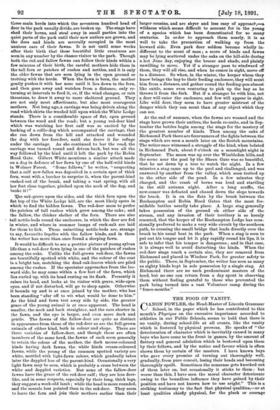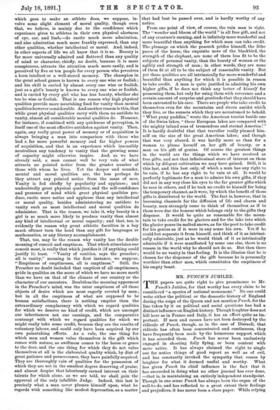THE FOOD OF VANITY.
CANON FOWLER, the Head-Master of Lincoln Grammar School, in the paper which he has contributed to this month's .Physique on the excessive importance accorded to athletics in our Public Schools, seems to hold that there is no vanity, during school-life at all events, like the vanity which is fostered by physical prowess. He speaks of "the deterioration of character which is inevitably caused in many boys who have come to the front in 'games, by the amount of flattery and general adulation which is bestowed upon them by their fellows, and by the notice and favour which is often shown them by certain of the masters. I have known boys who gave every promise of turning out thoroughly well, gradually, from pure conceit, losing their heads and becoming thoroughly spoilt. Sometimes the nonsense gets knocked out of them later on, but occasionally it sticks to them : but worse than this, I have seen the moral character deteriorate owing to the boundless influence they have gained by their position and have not known bow to use aright." This is a striking testimony to the fact that physical qualities,—or at least qualities chiefly physical, for the pluck or courage which goes to make an athlete does, we suppose, in- volve some slight element of moral quality, though even -that, we believe, is mainly due to the confidence which experience gives to athletes in their own physical alertness of eye, ear, and limb,—do excite much more admiration, and also admiration mach more frankly expressed, than any other qualities, whether intellectual or moral. And, indeed, in other aspects of life we all know that it is so. Beauty is far more universally admired and flattered than any quality of mind or character, chiefly, no doubt, because it is more conspicuous, attracts the attention much more easily, and is perceived by five or ten people for every person who perceives a keen intellect or a well-stored memory. The champion in the great school games is known to every one wise or foolish ; and his skill is envied by almost every one wise or foolish, just as a girl's beauty is known to every one wise or foolish, and is envied by every girl who has less beauty, whether she too be wise or foolish. That is one reason why high physical qualities provide more nourishing food for vanity than mental qualities however considerable. And another reason is this, that while great physical qualities carry with them no antidote to vanity, almost all considerable mental qualities do. Humour, for instance, if combined with any quickness of perception, is itself one of the most effective antidotes against vanity. Then, again, any really great power of memory or of acquisition is always bringing a man into comparison with those who had a far more powerful memory and far higher powers of acquisition, and that is an experience which insensibly neutralises any tendency to vanity that the growing sense -of capacity might otherwise inspire. And, as we have already said, a man cannot well be very vain of what attracts no pointed notice from the greater number of those with whom he lives. Yet the deeper and sounder, mental and moral qualities are, the less perhaps do they attract any pointed notice from the mass of men. Vanity is fed chiefly by popularity and applause; and undoubtedly great physical qualities, and the self-confidence and presence of mind which great physical qualities pro- duce, excite more notice and applause than any intellectual or moral quality, besides administering no antidote to vanity such as most intellectual and moral qualities do administer. That is the reason, we take it, why beauty in a girl is so much more likely to produce vanity than almost any kind of intellectual or moral capacity; and that, too, is evidently the reason why great athletic faculties in a boy much oftener turn the head than any gift for languages or mathematics, or any literary accomplishment.
That, too, may be the reason why vanity has the double meaning of conceit and emptiness. That which stimulates our conceit most, is really that which justifies it (if anything could justify it) least. " Vanity of vanities, says the preacher ; all is vanity," meaning in the first instance, we suppose, ." Emptiness of emptinesses, all is emptiness." Still, the Preacher no doubt included that emptiest of all emptinesses, pride in qualities on the score of which we have no more merit than we have on that of the climate of our country or the -character of our ancestors. Doubtless the meaning uppermost in the Preacher's mind, was the utter emptiness of all those objects of desire which are most eagerly coveted by man ; but in all the emptiness of what are supposed to be human satisfactions, there is nothing emptier than the -extraordinary complacency with which we regard qualities for which we deserve no kind of credit, which are amongst our inheritances not our earnings, and the comparative contempt with which we regard qualities for which we might really take some credit, because they are the results of voluntary labour, and could only have been acquired by our own painstaking efforts. As a rule, the one thing for which men and women value themselves is the gift which -comes with nature, as swiftness comes to the horse or grace to the deer, and the one thing for which they do not value themselves at all is the elaborated quality which, by dint of great patience and perseverance, they have painfully acquired. They are thoroughly vain of qualities for the possession of which they are not in the smallest degree deserving of praise, and almost despise that laboriously earned interest on their talents for which alone, as we are told, we shall gain the approval of the only infallible Judge. Indeed, this last is precisely what a man never plumes himself upon, what be regards with something like modest deprecation, as a matter that had best be passed over, and is hardly worthy of any notice.
From one point of view, of course, the vain man is right. The " wonder and bloom of the world " is all free gift, and not of any creature's earning, and is infinitely more wonderful and more beautiful than anything for which man can take credit. The plumage on which the peacock prides himself, the lithe paces of the horse, the exquisite note of the blackbird, the strength of the elephant, are none of them less fit to be the subjects of personal vanity, than the beauty of woman or the agility and strength of man ; in other words, they are none of them fit at all to be the subject of reasonable vanity. But yet these qualities are all intrinsically far more wonderful and beautiful than anything for which it is possible in reason to take credit. A man is quite justified in admiring his own higher gifts, if he does not think any better of himself for possessing them, but only for using them with reverence and a certain amount of surprise and gratitude that they should have been entrusted to his care. There are people who take credit to themselves even for the mountains and rivers amidst whic"h they live, or the sunsets which they are accustomed to behold. " What puny puddles," wrote the American tourist beside one of the Swiss lakes, "these European lakes are compared with the mighty inland seas of tremendous and eternal America!" It is hardly doubtful that that traveller really plumed him- self on the size of the great American lakes; and though that was very absurd, it was hardly more so than for a woman to plume herself on her gift of beauty, or a man on his gift of genius. Of course the greatest things in the world are the things which we have received as free gifts, and not that infinitesimal store of interest on them which by diligent cultivation we may have gained. Still, it is this last, and this last only, of which a man has any right to be vain, if he has any right to be vain at all. It would be perfectly legitimate for a man to admire his own gifts, if they did not in any way close his eyes to the far greater gifts which he sees in others, and if be took no credit to himself for being the temporary channel, as it were, by which the benefit of those gifts is distributed to the world. The fact is, however, that in becoming channels for the diffusion of life and charm and beauty, men strangely come to think of themselves as if to them were due the honour which belongs only to the gifts they dispense. It would be quite as reasonable for the moun- tain to take credit for its glaciers and for the lake into which the glacier pours its melted snows, as for the poet to take credit for his genius as if it were in any sense his own. Yet if he could but separate it from himself, and think of it as intrinsi- cally admirable, just as he would think of it as intrinsically admirable if it were manifested by some one else, there is no reason in the world why he should not do so. But then there would be no vanity in that feeling. It is the illusion that he is chosen for the dispenser of the gift because he is personally worthier than other men, which constitutes the emptiness of his empty boast.



















































 Previous page
Previous page